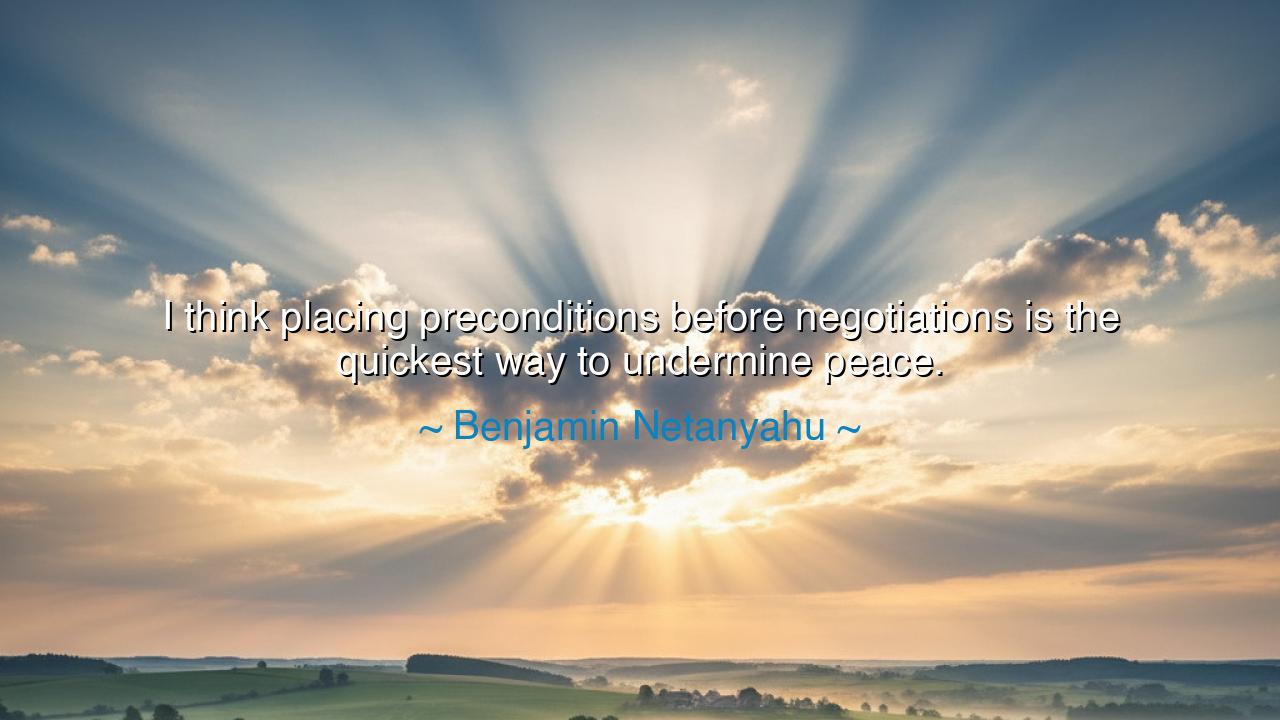
I think placing preconditions before negotiations is the
I think placing preconditions before negotiations is the quickest way to undermine peace.






Hear the words of Benjamin Netanyahu, forged in the furnace of conflict and spoken in the shadow of nations at odds: “I think placing preconditions before negotiations is the quickest way to undermine peace.” In this utterance we hear the wisdom of a man who has walked long years in the realm of diplomacy and battle. For he declares that if one demands victory before even speaking, then the conversation is slain before it has drawn its first breath. True dialogue, he reminds us, begins not with demands, but with willingness; not with obstacles, but with open hands.
The meaning of these words is sharp and unyielding. To place preconditions before talks is to say: “I will only hear you if you first surrender.” Such an approach kills trust, poisons the table, and closes the door before it is opened. For negotiation is not conquest—it is the art of seeking common ground in the midst of division. To undermine peace is not always to wage war; sometimes it is simply to build walls too high for dialogue to climb. Netanyahu’s saying is a call to humility: if you seek peace, begin by speaking, not by demanding.
The origin of these words lies in the bitter struggle of the Middle East, where cycles of violence and negotiation have risen and fallen like waves for generations. Netanyahu, as Israel’s prime minister, often stood in the center of these storms. His philosophy was born from hard experience: that endless demands and rigid preconditions delay talks, fuel suspicion, and allow conflict to fester. He believed that only by entering negotiations directly—without barriers—could trust be built and paths to resolution explored.
History gives us examples that confirm this truth. Recall the Camp David Accords of 1978, when Egypt and Israel—longtime enemies—sat across from one another. Had either side demanded surrender before talks began, nothing would have been achieved. But because they chose to speak, to meet without crippling preconditions, a peace treaty was born that endures to this day. It was not easy, it was not perfect, but it was real. The courage to negotiate without conditions opened the door to a new chapter of history.
And yet, we also see the cost of ignoring this wisdom. In the years leading up to the First World War, nations heaped demands upon one another, each condition harder than the last. By the time Austria’s ultimatum reached Serbia, the words themselves had become daggers, making dialogue impossible. The result was catastrophe: the blood of millions spilled because leaders preferred conditions to conversation. Thus, Netanyahu’s saying echoes across centuries: preconditions are not pathways to peace, but stumbling blocks that lead nations into ruin.
The lesson for us, children of tomorrow, is not for statesmen alone, but for every soul. In our own lives, when conflict arises in families, in friendships, in communities, we often act as nations do—demanding apologies, conditions, or guarantees before we will even speak. But such pride only deepens division. If we wish for reconciliation, we must begin with dialogue. The first step is not victory, but understanding. True strength is not in hardening the heart, but in opening it, even to those who have wounded us.
Therefore, let this counsel guide you: when strife comes, do not say, “I will only speak if you meet my terms.” Instead, begin the conversation. Lay down your arms of pride. Listen before you demand. For only then can trust be born, and with trust, the possibility of healing. Negotiation without preconditions is not weakness; it is the highest form of courage, for it dares to believe that even enemies can speak, and through speaking, find the path to peace.
So remember Netanyahu’s wisdom: the road to peace is not paved with demands, but with dialogue. If you wish to build, do not begin with barriers. If you wish to reconcile, do not begin with ultimatums. Begin instead with the courage to speak, the patience to listen, and the hope that words may yet heal what weapons can only destroy.






CTNguyen Thi Cam Tu
Netanyahu’s statement on preconditions reminds me of how peace processes often get bogged down by demands that seem impossible to meet upfront. But do preconditions always have to be a bad thing? Could they perhaps serve as a safeguard, ensuring that parties are serious about negotiations? I wonder how negotiators can balance the need for clarity and commitment with the openness required for meaningful dialogue. Are there examples where preconditions have actually helped peace efforts?
DQTran Dinh Quan
I agree with Netanyahu’s point that preconditions can derail the chance for peace, but I wonder—what happens when the lack of preconditions results in chaos or unproductive talks? Sometimes, it feels like negotiations need a structure, even if it’s not formal preconditions. How can leaders ensure that peace talks don’t devolve into empty discussions if no agreements are laid out beforehand? Where’s the line between structure and flexibility in negotiations?
LLam
This quote makes me reflect on how negotiations in politics can become more about power struggles than actual peace. Netanyahu’s point about preconditions seems valid, but isn’t there always some form of expectation or requirement when entering into negotiations? How do we avoid letting those preconditions create divisions while still ensuring that basic principles or values are upheld? It seems like finding common ground is key to overcoming this challenge.
HGNguyen Tran Huong Giang
Benjamin Netanyahu’s statement about preconditions undermining peace is interesting, especially when you consider how often preconditions are used in negotiations. While it’s true that they can create unnecessary barriers, are there situations where they might be necessary? For example, should parties involved in peace talks have clear commitments before proceeding? It’s a delicate balance between establishing ground rules and keeping the door open for genuine negotiation.